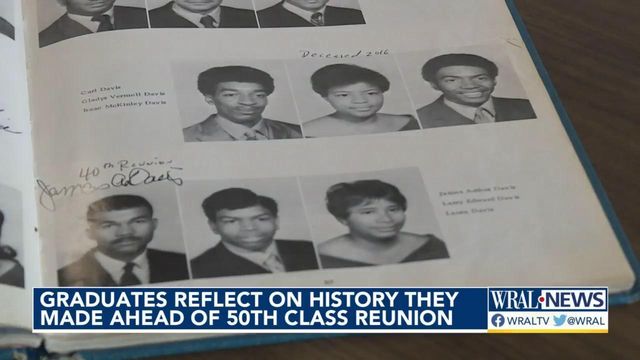High school graduates celebrating 50th reunion recall going through integration of public schools
A group of high school graduates from Warren County are set to celebrate their 50th class reunion this weekend, and while the world has changed a lot in those five decades, one of the biggest changes for them came while they were still in school.
Posted — UpdatedJames Graham high’s class of 1971 spent the first half of their high school career in segregated schools, and the second under integration.
“We went through a lot, and most people don’t realize it,” graduate Calvin Bullock said. “If you weren’t there, you wouldn’t know.”
In the small town of Warrenton on Friday morning, a group of people in their late 60s came together to reminisce.
They went to high school together at Warrenton’s John Graham high.
The upcoming weekend would mark 50 years since they graduated in 1971, but the most important date of their high school career came two years earlier.
“We were at John R. Hawkins High School up until our junior year,” graduate Glenn Alston said. “And then we went over to John Graham, the white school.”
When their high school career began, many cities in North Carolina still had segregated schools.
The graduates spent their freshman and sophomore years at John R. Hawkins – Warrenton’s black high school.
But in 1969, Warrenton integrated its schools, tearing down Hawkins high school and sending the black students down the road to John Graham – the white school.
The graduates still remembered the difficult transition.
“I’ll never forget the first day, going over to get on the bus and the door was locked,” graduate Richard Tunstall said. “And students were hollering out the window calling us the n-word, telling us we stink, we smell like skunks.”
“They treated me like we were not wanted,” Bullock said. “And they made it plain, not only students, but teachers as well, made it plain that we were not welcome.”
At the integrated school, the resources were better, but the graduates said black students didn’t get as much support as the white ones did.
The graduates told WRAL News that in and outside of the classroom, instead of spending their days pushing back against racism, they learned to disappear.
“Quietness, I guess is the best way to put it,” Bullock said. “I knew that it was a battle that I couldn’t fight.”
“Even though I didn’t like being there, I had to go through it,” he continued.
“We wear the mask, I got it today, I was wearing it then,” graduate Hazel Blount said. “In grins and lies, shade your cheeks and hide your eyes.”
“And so you’re just there,” she continued. “That’s all.”
But they’ve spent the five decades since making their voices heard.
“We have survived,” graduate Imogene Bullock-Steverson said. “In this room, you have two doctorates, you have engineers, you have teachers at all levels."
“You name it, we have survived,” Bullock-Steverson continued.
They’ve also worked to understand what they went through.
“Over time, I came to realize that, you know what, that was not that kid, and it was not that kid’s fault,” Tunstall said. “That was what he was taught.”
When they reflected on their high school career, the graduates said they had laid the groundwork for a better world, although they knew the fight didn’t end with them.
“It’s heartbreaking that in 2021, we’re still talking about voter suppression and that type of thing that you thought would have died years ago,” Tunstall said.
But the word to describe this achievement?
“A feeling of pride, a feeling of accomplishment, a feeling of doing some things that a lot of people either did not do or didn’t have the opportunity to do,” Bullock said. “The pride is the main thing. We made it.”
Related Topics
• Credits
Copyright 2024 by Capitol Broadcasting Company. All rights reserved. This material may not be published, broadcast, rewritten or redistributed.





